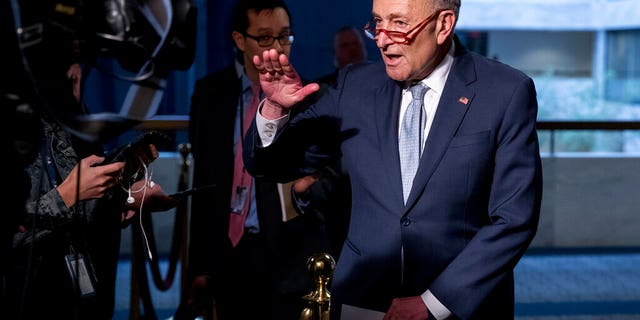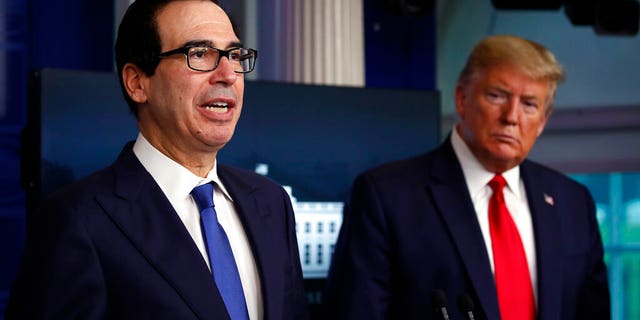Get all the most recent news on coronavirus and more provided daily to your inbox. Sign up here.
The Senate on Tuesday passed an almost $500 billion coronavirus “Phase 3.5” relief expense that would replenish a small company rescue program referred to as the Paycheck Security Program (PPP), provide medical facilities with another $75 billion and implement a nationwide virus screening program to facilitate reopening the economy.
The procedure gone by voice vote, which simply requires each side to cry “yay” or “nay,” with the louder side winning. Ahead of the costs’s passage, some Republicans voiced their disappointments that there was not a complete roll call vote, even as some senators stayed at home in the middle of the pandemic. ” This is not appropriate,” Sen. Mike Lee, R-Utah, stated on the Senate floor. “We need to not be passing legislation … without Congress actually being in session.”
FULL TEXT OF FINAL COSTS
And, Sen. Rand Paul, R-Ky., declared that Congress should stop “printing bailout money” because the U.S. ” can handle this illness without the exorbitant lockdown of the economy.” Revealing his opposition to the stimulus in no uncertain terms, he informed associates: ” We can’t advance this course.”
At the exact same time, Paul kept in mind that he “has actually not conjured up the Senate rules to require a vote” by roll call– and was present just so that history would tape-record that not every senator favored spending $484 billion.
Rep. Steny Hoyer, the House majority leader, stated on a teleconference with reporters that House votes would take place Thursday. He stated your house will also vote on a proposition to permit proxy voting during the pandemic, a first for Congress, which has actually required in-person service essentially considering that its starting.
READ A SECTION-BY-SECTION SUMMARY OF THE NEW STIMULUS; READ SUMMARY OF NEW HHS FINANCING
The brand-new deal would provide more than $300 billion for the PPP, with $60 billion or two reserved– and divided equally– for smaller banks and community lending institutions that seek to focus on under-banked communities and rural areas. Another $60 billion would be offered for a small-business loans and grants program provided through an existing small-business disaster aid program, $10 billion of which would be available in the type of direct grants.
Ahead of the planned vote Tuesday night, Senate Bulk Leader Mitch McConnell, R-Ky., criticized Democrats for postponing a vote on more funding for a number of days, well after the PPP fund was tired last Thursday. Talks have actually dragged as the Democrats tacked on the health top priorities, including funding for health centers, and the 2 sides have actually quarreled over the design of an across the country screening routine, to name a few pieces.



FILE – In this March 20, 2020, file photo Senate Minority Leader Sen. Chuck Schumer of N.Y., speaks to press reporters as he gets here for a meeting to discuss the coronavirus relief bill on Capitol Hill Washington. The Trump administration and Congress are nearing an agreement as early as Sunday, April 19, on a $400- plus billion aid package to enhance a small-business loan program that has actually run out of money and include funds for healthcare facilities and COVID-19 testing. (AP Photo/Andrew Harnik, File).
” Republicans never ever wanted this important program for workers and small businesses to shut down,” McConnell stated. ” We tried to pass extra funding a week prior to it lapsed. But Democratic leaders obstructed the money and invested days attempting to negotiate extraneous problems that were never on the table. I am grateful our coworkers have left those demands and will lastly let Congress act.”
Democrats were rebuffed in a request for another $150 billion in aid to revenue-strapped state governments, however left satisfied that the administration will assist deliver such aid in the next aid costs. There’s likewise pressure to assist cities with populations of less than 500,000 that were locked out of the massive $2 trillion relief expense that passed last month.
AOC CELEBRATES OIL CRASH IN NOW-DELETED TWEET
Senate Minority Leader Chuck Schumer, D-N.Y., informed associates Tuesday he was likewise ” disappointed that Republicans did not work with us to reinforce SNAP benefits for the food insecure.” Other prominent progressives, consisting of Rep. Alexandria Ocasio-Cortez, D-N.Y., have suggested they’ll oppose the strategy in its present type since it does not do enough for illegal immigrants and low-income constituents.
A Democratic source told Fox News that Schumer informed associates on a conference call that there will be a “Stage 4” costs, and some of the leading concerns Senate Democrats are pursuing including funding for state and city governments, rental help, election stability, the Postal Service, and others.
And, House Speaker Nancy Pelosi, D-Calif., validated the delay on Sunday by stating she wanted more financing for testing and hospitals– uncontroversial demands that even left-of-center commentators have actually pointed out that Republicans never ever opposed, regardless of news reports indicating otherwise.
In a joint statement Tuesday afternoon, Pelosi and Schumer pointed the finger back at Republicans, although they acknowledged the delay resulted from their attempts to add more products to the bill.
” It is unfortunate that Republicans’ refusal to work out in a bipartisan way postponed contract on this legislation,” they composed. “Now, Congress will move promptly to bring this legislation to the floor and pass it today, so that we can bring desperately-needed resources to those who are suffering. As quickly as it has passed in your home, we will advance CARES 2, which should be transformative and significant.”
That screen of what McConnell called “reflexive partisanship” assisted swell what was originally developed by Republicans as a $250 billion substitute to replenish the payroll subsidies for smaller services into the 2nd biggest of the 4 coronavirus action expenses so far.
McConnell went on to say he was “sorry that it took my coworkers in Democratic management 12 days to accept the inescapable, and that they shut down emergency situation support for Main Street in a search for partisan ‘leverage’ that never emerged.”



FILE – In this April 13, 2020, file picture President Donald Trump listens as Treasury Secretary Steven Mnuchin discusses the coronavirus in the James Brady Press Rundown Room at the White House in Washington. The Trump administration and Congress are nearing an agreement as early as Sunday, April 19, on a $400- plus billion help plan to enhance a small-business loan program that has run out of money and include funds for hospitals and COVID-19 testing. (AP Photo/Alex Brandon, File).
” This bipartisan contract will offer more than $320 billion in additional financing for the Income Security Program, which is already helping millions of small-business workers get paychecks rather of pink slips,” McConnell continued. ” This is much more money than Senate Republicans first asked for. At our request, there will now be a special focus on community banks and credit unions.”
He included: “Thanks to the hard work of associates such as Senator Collins and Senator Rubio, there will likewise be $60 billion more for Economic Injury Catastrophe Loans, and since of the effort of Senator Roberts, Senator Daines, and our other colleagues from rural states, it will be clear that farmers and ranchers are eligible.”
CORONAVIRUS TIMELINE SHOWS MULTIPLE FLIP-FLOPS BY JOURNOS, POLITICAL LEADERS
The contract would also contain $75 billion more to health centers and health care companies, as well as “$25 billion for state-led COVID-19 testing strategies and for research study, development and other screening support from key firms such as the CDC [Centers for Disease Control and Prevention] and the NIH [National Institutes of Health],” McConnell said.
In his letter to coworkers, Schumer mainly claimed triumph and asserted that Democrats’ delays had produced outcomes that Republicans otherwise may not have accepted.
” Under this agreement, Democrats have protected $220 billion above and beyond what Republicans proposed, including new financing for small companies through community banks, brand-new financing for our health care system, and a substantial down-payment on a national screening routine, which specialists say is needed for resuming our economy,” Schumer wrote.
The PPP has been swamped by business getting loans and reached its appropriations limitation last Thursday after approving almost 1.7 million loans. That left countless small businesses in limbo as they looked for aid. The National Federation of Independent Business, a GOP-friendly organization that advocates for small companies in Washington, stated it had actually surveyed their members and reported that only one in five candidates had actually gotten cash up until now.
Controversies have actually enveloped the program, with numerous companies grumbling that banks have preferred consumers with which they currently do business. Some organisations that haven’t been much harmed by the pandemic have actually likewise received loans, together with a variety of publicly traded corporations.
Fox News’ Chad Pergram and Mike Emanuel contributed to this report, along with The Associated Press.

